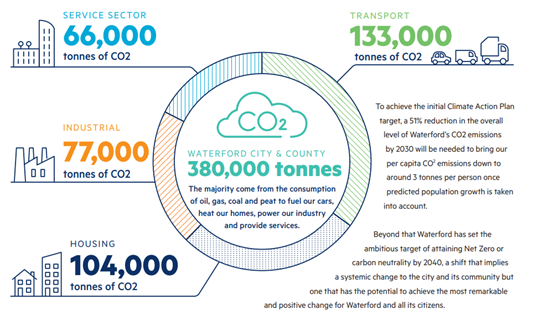Waterford City - The journey become the country's first carbon neutral city
Under Action 165 of the National Climate Action Plan 2019, every local authority in Ireland was required to designate a zone within their remit for decarbonisation.
As per the national government circular letter LGSM01-2021, a decarbonising zone (DZ) can be described as a “spatial area identified by the local authority, in which a range of climate mitigation, adaptation and biodiversity measures and action owners are identified to address local low carbon energy, greenhouse gas emissions and climate needs to contribute to national climate action targets.”
The identified zone should look to implement projects that target deliverable outcomes as regards emissions reductions. These outcomes must align with national government’s targets for emissions reductions. Specifically, the target of a 51% reduction in greenhouse gas emissions for the period 2021-2030 (roughly 7% per annum).
In April 2021, Waterford City and County Council announced Waterford City as its designated decarbonising zone. The city will act as a testbed for initiatives to transition away from a fossil-fuel based economy and towards one that is carbon neutral. This will require deployment of measures such as building energy efficiency upgrades, sustainable transport routes, renewable energy generation and carbon sequestration.
If you would like to make a submission on this section click on "Make a Submission"
The challenge - where are we now
Waterford is a compact city with a population of over 50,000 people that is continuing to grow. Project Ireland 2040 envisages the population of Waterford City and Suburbs to grow between 30,000 - 35,000 people (or 50-60%) by 2040. It serves as the regional capital of the southeast. It has a large industrial base, regional medical facilities, third level education and an array of retail/sector services. It is serviced by multiple transport links.
Waterford City’s total carbon emissions at present amount to an estimated 380,000 tonnes CO2 equivalent per annum. That works out at about 7.6 tonnes per person. The following is a breakdown of these emissions:

The reduction in greenhouse gas emissions will require a systematic change on an unprecedented scale with improved building efficiency, active travel and many more measures. The Council will look to operate in an exemplar role to reach this ambitious target, but it cannot do it alone. With input, effort and assistance from all sectors of society, there is potential to achieve the most remarkable and positive change for Waterford and all its citizens.
The Challenge - What do the Council and Citizens need to do
As previously mentioned, achieving decarbonisation will require an all of society change. The Council has published a roadmap to assist with implementation of measures and has broken the challenge down into 6 programme groups.
The programme groups have identified general and specific actions for achieving decarbonisation and eventual carbon neutrality. Proposed measures include:
- Carbon neutral business and services - Ensure smart design to achieve Near Zero Energy Building (NZEB) standards for all new industrial and commercial buildings through the planning system.
- Carbon neutral homes - Increase the housing retrofit target from 250 to 500 homes per year, with this eventually rising to 1000 homes per year.
- Carbon neutral travel - Develop an extensive cycle network and provide secure cycle parking and work to significantly increase cycling’s modal transport share.
- Sustainable consumption - Stimulate the sharing, reuse and repair economies and waste food to energy potential.
- Developing renewable energy locally - Develop energy co-operatives.
- Increasing urban resilience - Develop a landmark biodiversity and carbon storage project
Where does the Council have influence
- The Council has influence over its own buildings and social housing stock. It will look to retrofit these to improve Building Energy Ratings (BER) and achieve Near Zero Energy Building Standards (NZEB) where possible.
- The Council has a dedicated Active Travel Scheme that will continue to improve walking and cycling routes throughout the city and county. The Council is responsible for roads management and parking policy.
- The Council has control over public lighting in Waterford. All public lighting will be retrofitted to energy-efficient LED bulbs under the Public Lighting Energy Expenditure Project (PLEEP). This project is due to commence in late 2023.
- The Council will transition its transport fleet on phased basis from fossil fuel vehicles to electric and low/no emission alternatives. Additional public charging infrastructure will also be implemented. This process has already commenced.
- The Council liaises with communities through a number of initiatives. The recently launched Community Climate Action Programme will see the Council liaise with local groups to undertake climate-orientated projects such as installation of renewable energy technologies, biodiversity actions or building retrofitting. This programme is funded by the government and overseen in Waterford by the Council.
- The Council is responsible for the approval of new planning applications. While renewable energy farms are welcomed from a carbon emissions perspective, it is imperative that appropriate public consultation is undertaken by the companies looking to implement them, with the communities they are proposed to be situated in. The Council must act in the best interests of its citizens when approving applications and take all factors into account.